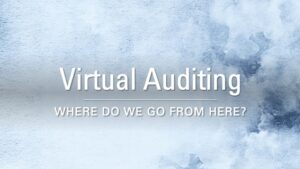Virtual Auditing – Where Do We Go From Here?
 ISO 19011:2018 has more guidance for remote auditing than the previous versions. There are a number of advantages to the client when a remote audit takes place:
ISO 19011:2018 has more guidance for remote auditing than the previous versions. There are a number of advantages to the client when a remote audit takes place:
- Lower expenses charged to the client – no travel time, mileage, accommodation costs
- Less damage to the environment
- Auditors can spend more time with their families
There are a few things to consider during virtual audits:
- Communication technologies – do we have the band width?
- Do auditors and auditees know how to use the tools?
- Registrars usually mix the onsite and remote activities – fully remote can be justified, but you and the Registrar will have to justify the decision
Audit objectives still have to be met. The remote audits I’ve done myself have been able to do this, so with a little planning, it can be done. I’ve adjusted my checklists to make them more electronic rather than hand written, but that’s just a personal choice. Either will work well, just be sure to retain the checklists as evidence of the audit. The Audit Report will have to note that the audit was done remotely so that the reader is ware of the format of the audit.
Our cloud-based platform can really help your organization if you’re thinking that you’ll have to have your Registrar do a remote audit. Let us know if you’d like a demo! Click to arrange a demo.
Joins us on April 27th, 2020 at Noon EDT for a FREE WEBINAR “Enhanced Internal Auditing”
Sign up here: “Enhanced Internal Auditing” FREE WEBINAR
